

Ministerio de Ciencia e Innovación of Spain
Three years: sept-2021 a sept-2024
UPCT
Biocyma
Universidade de Aveiro
VU University Amsterdam
WARMET aims to assess whether spontaneously-colonized and conventional technically reclaimed (capping and afforestation) metal mine tailings soils of Mediterranean semiarid regions differ in their response to climate change in terms of functionality and ecotoxicity.
Soil pollution is one of the major threats facing terrestrial ecosystems. Metal mine wastes from ore processing are among the most hazardous residues (high metal levels, extreme pH, high salinity, organic matter/nutrients deficiency, poor physical structure). These wastes are often deposited in open-air piles (mine tailings). Classic-restoration approaches (technical reclamation) usually involve topsoil capping aiming to create a new soil above wastes and then afforestation. These options have been questioned in (semi)arid regions due to ecosystem inability to be self-sustaining. An alternative, based on nature-based solutions principles, is to promote the growth of plants directly in mine wastes (phytomanagement by phytostabilization). This contributes to create the so-called fertility islands that may promote plant-soil feedbacks and ecosystem functioning. If tailings pose immediate risks, the necessary financial/technical means should be made available for immediate technical restoration. However, if conditions are not so extreme, the spontaneous succession of plants directly growing in mine wastes has some advantages (e.g., plants adaptation to local climate/substrate conditions, high natural value, improved long-term sustainability). Previous works showed that the direct grow of native plants in tailings can provide functional soil-vegetation systems with attenuated ecotoxicity, but functional and ecotoxicological aspects of conventionally restored tailings are scarce or even lack. Furthermore, how systems functionality and ecotoxicity will respond to climate change is still an open question. Answering these questions is core for evaluating the suitability of phytomanagement vs. conventional techniques for mine tailings restoration in (semi)arid regions.
Specific objectives: 1) assess how and to what extent spontaneously-colonized and technically reclaimed metal mine tailings soils currently differ in functional and ecotoxicological aspects; 2) assess the effects of forecasted climate change scenarios (simulated by increased atm. CO2 and air temperature and decreased soil moisture) on the functionality and ecotoxicity of spontaneously-colonized and technically-reclaimed metal mine tailings soils. WARMET will include a field-work phase and a lab-experimental phase. The field-work part will carry out an evaluation of the functionality and ecotoxicity of the soil-plant system from the different types of mine tailings under study, considering areas with vegetation and adjacent bare soils. The lab-experimental part will consist of subjecting field soils to different climate change scenarios according to IPCC projections for 2100. In both cases, physical, physico-chemical and biological parameters (in)directly related to systems functionality and ecotoxicity will be tackled. Furthermore, soil ecotoxicity will be assessed through a battery of bioassays with soil microorganisms, invertebrates and plants. WARMET will allow forecasting climate change effects on mine tailings systems and improving their management, which, in turn, will enable a better adaptation and/or mitigation of the effects of this phenomenon.
PRESS NEWS:
BOOK CHAPTERS
Ceacero-Moreno, M., Álvarez-Rogel, J., González-Alcaraz, M.N. 2023. Carbon and nitrogen mineralization in metal mine tailings technically recovered vs. abandoned spontaneously colonized by vegetation as indicator to assess soil functionality. In: Artés Hernández, F. et al. (Eds.), Proceedings of the 12th Workshop on Agri-Food Research, Technical Univ. Cartagena. ISBN 978-84-17853-74-7. pp. 111-114
COMMUNICATIONS IN CONGRESSES
González-Alcaraz, M.N., Ceacero-Moreno, M., Martínez-Sánchez, J.J., Conesa Alcaraz, H.M., Álvarez-Rogel, J. Una aproximación multidisciplinar para evaluar la respuesta al cambio climático de depósitos de residuos mineros abandonados colonizados espontáneamente por la vegetación vs. depósitos técnicamente restaurados: el proyecto WARMET. XXXIII Reunión Nacional de la Sociedad Española de la Ciencia del Suelo, España (Septiembre 2023). Póster.
Ceacero-Moreno, M., Álvarez-Rogel, J., Conesa Alcaraz, H.M., Martínez-Sánchez, J.J., González-Alcaraz, M.N. La colonización vegetal espontánea de depósitos de residuos mineros metalíferos abandonados puede desencadenar procesos funcionales del suelo similares a los de los depósitos técnicamente restaurados. XXXIII Reunión Nacional de la Sociedad Española de la Ciencia del Suelo, España (Septiembre 2023). Póster.
Ceacero-Moreno, M., Álvarez-Rogel, J., Conesa Alcaraz, M.H., Martínez-Sánchez, J.J., González-Alcaraz, M.N. C and N mineralization in metal mine tailings technically recovered versus spontaneously colonized by vegetation as indicator to assess soil functionality. Oral. SETAC Europe 33rd Annual Meeting in Ireland (April-May 2023).
Ceacero-Moreno, M., Álvarez-Rogel, J., Conesa Alcaraz, M.H., Martínez-Sánchez, J.J., González-Alcaraz, M.N. Could nature successfully trigger soil functional processes in metal mine tailings or do we always need a man made restoration intervention? Poster. SETAC Europe 33rd Annual Meeting in Ireland (April-May 2023).
